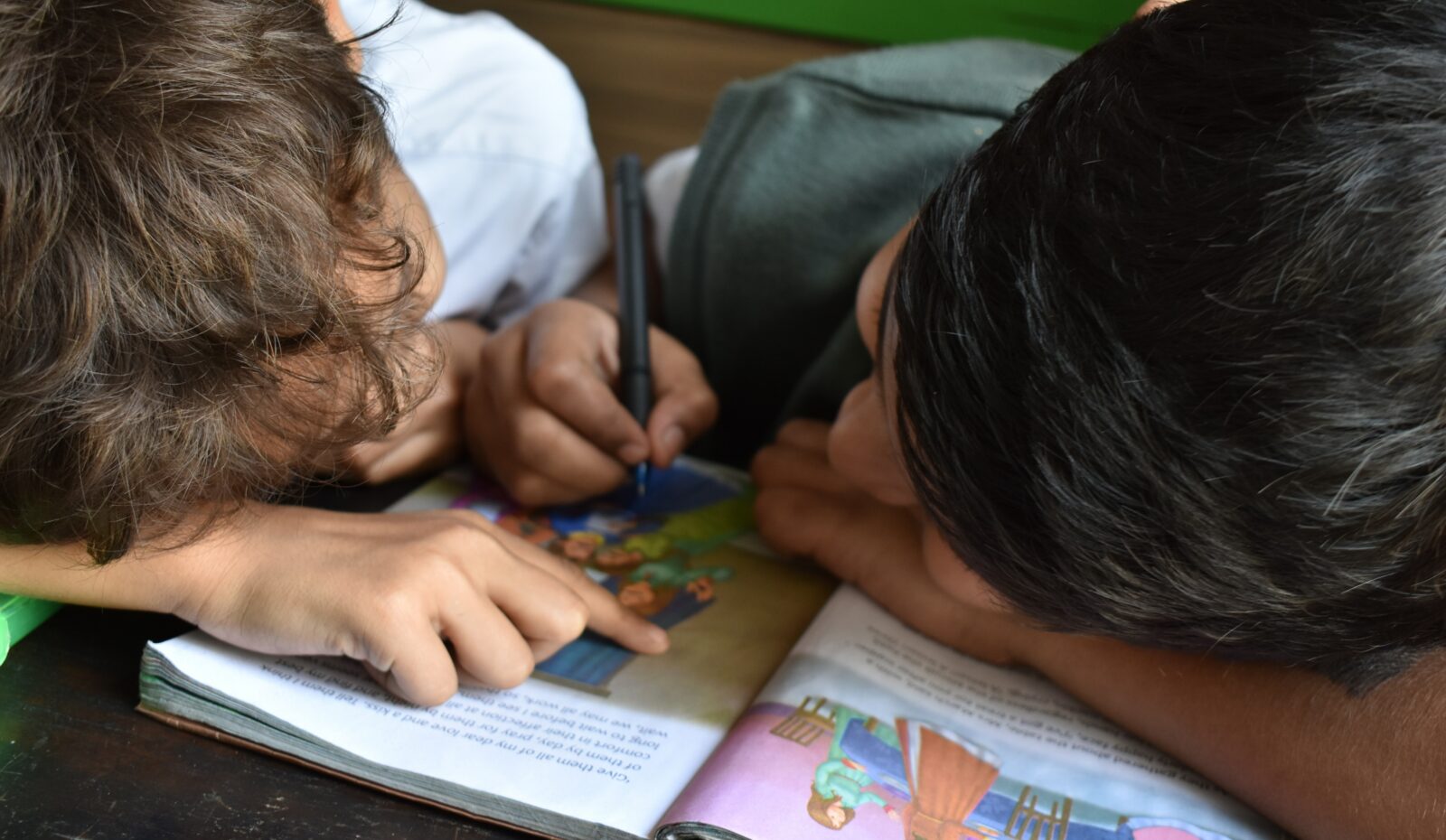Starting to think about school choices for Fall 2023? You’re not alone. It’s the time of year when a lot of families are starting to think about school decisions, like how to choose a school, how to know whether your child is ready for kindergarten, or just how to best support your child’s education. We have several educators on our contributor team and last winter we asked for their advice on some common questions – enjoy their wisdom as we revisit it this year!
Meet The Educators

Ashley Schafluetzel
Ashley has been a kindergarten teacher in Missouri for 11 years and it is her absolute favorite thing to do, even on the tough days. She’s also mom to a third-grader and soon-to-be-kindergartener.
Lisa Payne
Lisa is an early childhood special educator in a school district in Kansas, where she supports both students and teachers on setting and attaining goals. She is also a single mother to four kids.


Joanna Martin
Joanna holds degrees in Child Learning and Development and Psychology, and taught 3rd grade outside Dallas, TX, before leaving the classroom to stay home with three young kids.
Katherine DeVries
Katherine spent 10 years teaching middle school English in public and charter schools throughout the Los Angeles area. She is currently staying at home with three young kids.

Keep reading to hear how these educators answer some of the most common questions we get from moms about choosing a school, getting ready for school, and finding your way once you’re there.
What do you wish parents knew about choosing “the right school”?
KD: Parents sometimes put a lot of weight on test scores and accolades (which are often tied to test scores). But it’s always worth thinking about why those test scores are what they are. For example, there’s a large military base in the school district where I used to work. Because of that, a lot of families move in and out throughout the year. A lot of those kids are super smart, but if the teachers at their old schools weren’t using the same pacing as the teachers at their new school, it’s going to look like they are “behind” when the test day comes around. So instead of focusing solely on scores, I would ask about the quality of the teaching, and the community, and how much value schools place on test scores vs. other, potentially more valuable, measures of growth.
JM: The words ‘right’ and ‘perfect’ are not synonymous when it comes to education. I think that many times when parents are looking into different school situations for their children they think that the “right” school will be one that has no faults whatsoever, but perfection isn’t attainable in any situation. Going into a school decision with a list of non-negotiables for your child and your family is key and keeping in mind that your child’s educational experience is the primary focus at the end of the day, not necessarily your parental experience.
What do you wish parents knew about what it means to be “ready for kindergarten”?
AS: Academically, if a child understands and knows some letters / letter sounds, can count to 20 (it’s common to mess up teen numbers), recognizes their name in print and recognizes some numbers, I consider that a good starting place. In terms of motor skills, if a child can hold a pencil, write their name, use school tools safely, and open/close containers, we are set! Having good self-help, self-care skills is important, too.
Social/emotional readiness is so much more important – I wish parents knew that! Your child needs to be working toward being a problem solver; we want them to be independent and remember the classroom routines when the teacher is busy or helping someone else. To practice at home, give multi-step directions and allow your child to work through them; this will help them practice listening, sequencing and retaining steps. Knowing how to ask for help and communicating their specific needs is also important. I have students who will just hand me a water bottle or a pencil; I can guess what they want, but it is much easier if they can explain what they need!
Finally, I wish parents knew that our kids are listening to us, and they mimic our behavior. (Especially after these past couple of years with more time at home!) Use kind words about others in your home; save conversations you don’t want your child repeating at school until they’re asleep. It’s hard to teach children not to call other children inappropriate names if their parents do it.
KD: I think a lot of parents are surprised by the fact that kindergarten readiness has more to do with social-emotional development than academic development. Most of the kids I know who were recommended to not start kindergarten were kids who were pretty book smart (knew their letters and numbers, etc.) but would have had difficulty sitting through a traditional school day, or working independently with their peers. Also, it’s never a judgment on your parenting if your kindergartener has been asked to stay back a year–it almost always has everything to do with their brains, and nothing to do with you.
JM: Readiness is a spectrum. Each and every child hitting the ground running on the first day of kindergarten will be at vastly different levels and comparison will not serve you or your child in positive ways. I think that the best preparation you can give your child is open-ended play situations at home, space and the ability to draw and use scissors, and social experiences that offer opportunities to share and practice independence. I also think having discussions with preschool teachers or if your child attends any sort of therapies is important to gauge readiness. Viewing these important people as team resources who have valuable information to add towards your child’s success.
LP: Ready for kindergarten is really two-fold: pre-academics and social skills. Pre-academics will be built upon in kindergarten, so a foundation of basic skills is helpful in making those first learning experiences successful. Paired with that are social skills which prove equally as important for success.
Pre-academic readiness looks like: Counting to 20, singing the ABC song, knowing some letters, numbers, colors and basic shapes, recognizing their name in print, holding a writing utensil to make lines and basic shapes
Social readiness looks like: Playing well with others (taking turns with materials and ideas, offering items to others, etc.); transitioning from one activity to another with little difficulty; starting to establish more independence (using the restroom, putting shoes on, etc.) and completing simple chores at home; asking for what they need. (help using the restroom, help getting a snack open); following a simple direction; starting to self-manage upset; attending to a story you read together.
What do you wish parents knew about visiting a school, touring a campus, or attending an open house?
KD: A pretty room isn’t everything. I know that a lot of administrators put a lot of emphasis on “what’s on the walls” of the classroom. They want bright, colorful work to be displayed, and for teachers to post lots of beautiful rotating bulletin boards. And they do this because parents, and the higher ups at the district, LOVE it. But during my ten years in teaching, I visited a lot of classrooms. And observed, and worked closely with, a lot of teachers. And I can tell you that the pinterest-perfect classrooms didn’t always correlate with the highest level of teaching. In fact, some of the teachers with the loveliest rooms were the ones I would not request for my own children. Instead, talk to the teachers you meet, and really look closely at the work that’s on their walls. When you ask that English teacher about the first book she’s planning to teach, does she light up? Does she want to talk your ear off about it for so long that you have to back, slowly out of the room? Are the essays on her walls covered with positive and constructive feedback? Are some of the projects not on the walls because they involve intense, collaborative, multi-modal work that can’t be displayed in that way? Does the teacher spend so much time lesson planning, and grading, and learning that she doesn’t have time to cut shapes out for a bulletin board? Because that’s the teacher, or the school, that I want.
AS: Ask questions! Ask follow-up questions! Learn about the teachers, share about your child, your family – whatever you can! We love getting to know you. I take notes after people leave about my students’ likes / dislikes/ family / pets / etc., so I can connect with the child later.”
JM: You are allowed to visit and tour multiple times! So often I feel that parents are nervous or afraid to schedule follow up tours or ask more questions. Schools offer tours and open houses for the purpose of answering any and all questions as a free resource to parents and families who are curious.
What do you wish parents knew about learning to read?
LP: Literacy starts at home with SIMPLE activities, such as narrating your day. Talk about each part so they are learning sequencing as well as vocabulary. Reading a book each day (even if it’s the same book over and over) develops pre-literacy and literacy skills (sequencing, retelling, predicting, letter and letter sound learning, personal experiences tied to the book). Singing the ABC song, and then adding the visual representation of each letter to that is a great way to start pairing letter to letter name, and then letter name to letter sound. Learning should be fun, not flashcards. Making games (“I spy the letter L/something that starts with /l/,” “run and get something that starts like this ‘/b/”) will get more of the brain involved and help the child want to learn more. Reinforce and gently steer in the right direction if they misremember the new information they are learning.
AS: Be a reader yourself! Read with your child before bed. When teaching letters – teach the sounds and lowercase letters, those are what they will use first. Lowercase letters are what we see in print and sounds are what we use to sound them out. A child can read using just letter sounds, the names are relevant, but not as important as knowing the sounds. Another important piece of reading is phonemic awareness: recognizing rhyming words, giving rhyming words, identifying beginning and ending sounds – all of these are good skills to have to start reading!
KD: Oh my goodness it takes forever. I think the most important thing you can do for your kid if you feel like they are struggling is not pressure them. The kids who are usually the best readers, are the ones who read a lot. And they read a lot because they enjoy it. So find something your kid enjoys, even if that’s a super short graphic novel that you think is stupid. The more pressure you put on them, and the more you make them feel like they’re behind, the harder it’s going to be.
JM: Learning to read, willingness to read, excitement towards reading, and developmental readiness to read are all vastly different concepts that are often conflated to mean the same thing. When a child meets that magical intersection of developmental readiness and willingness it is evident. With all learning it is a spectrum and no child is alike. I personally (as a parent and former teacher) have always held tight to the rule that when tears start, learning stops. If learning to read is often a frustrating situation or resulting in tears for your child or yourself then it is time to step back and take a break.
What do you wish parents knew about kids and friendships, and social dynamics on the playground?
JM: Social dynamics are a part of education just as much as reading, writing, and math. We are sending our children into communities every day that are reflective of the world and its social dynamics. Each child is learning, testing limits, setting boundaries, and figuring it out. One of the best resources a parent can offer any child at the end of the day is to be a safe place to talk to about social situations. So often the real learning and reflection about social dynamics is done at home while using a parent as a sounding board.
LP: ALL kids want to be included. It’s imperative that we are teaching kids at a young age to be inclusive of all children, no matter what different abilities they have. When your child is feeling excluded, teach them some strategies to use (ask a group to play, find another friend, choose a new piece of equipment, look around and see who else might not have anyone to play with and make a new friend). Have open conversations at home about “what if” scenarios, and encourage your child to come up with some suggestions to try.
KD: In middle school, kids can be the protagonists of their own realities. They see things through a very narrow lens, and almost always have difficulty identifying the ways in which they may have contributed negatively to a situation. I think it’s super important to always be on your kid’s team, and make sure they know that you’re a safe space for them, but it’s also important to take their grand declarations of good and evil with a grain of salt. I have yet to meet a middle school fight in which both parties weren’t at least a little bit at fault. At the same time, however, kids can be very possessive of their social status. If a kid feels like another kid could potentially pull him or her down a rung on the social ladder, they can be very cruel about it. These situations can be super tricky, and it can sometimes be helpful to reach out to teachers, who might be able to help initiate other friendships in the classroom, or help remove kids from a situation when it starts to become toxic.
What do you wish parents knew about making school decisions for a special needs student?
AS: As a teacher (stepping out of my special needs mom role here) – we want to help your child! However, depending on the state you’re in – it can be hard for younger students to qualify for services, for many reasons. Be your child’s biggest advocate; get medical support from your child’s doctor. If a school asks you to talk to your pediatrician, please do: we are trying to get your child the help they need!
As a mom to a daughter with cerebral palsy, I understand it can be frustrating to walk through the school support process. My daughter requires a full time paraeducator, and yet she didn’t “qualify” from school evaluation alone; she only qualified because I have a medical note from her doctor saying she needs support and has cerebral palsy. They averaged her test scores, which resulted in a not-low-enough score because she is smart, can socialize and advocate for help. It completely invalidated the fact that she can’t walk, struggles to complete any writing tasks and can’t fully care for herself. So, yes. It’s frustrating.
KD: I think it’s always important to advocate. And when you feel like you’ve advocated enough, and are getting annoying, you’re not. Advocate more. Teachers are so busy, especially now, and they can get super overwhelmed by their caseloads. I always appreciated when parents reached out to me right away when they noticed that something wasn’t being implemented the right way in my classroom.
On a school level, I would make sure to ask a lot of specific questions about what kind of support team is available, and what their case-loads look like. If your child is going to be assigned an aide, or other special staff, I would ask to meet them in person. I would also read your child’s IEP carefully, and ask questions about how, exactly, the major points will be implemented–not on an aggressive level, of course, but on an “I’m paying attention,” level instead.
LP: Your child’s IEP or 504 plan should include things for your child to be successful in the school setting. If you’re feeling uneasy, ask to speak with the principal, school psychologist or counselor to help ease any concerns you have. Schools are made to meet kids where they are. Teams of specialists come together to put your child’s best interest at heart and YOU are an incredibly important part of that team. Don’t be afraid to speak up, ask for a team meeting when it’s needed, and ask for open communication from the school/teacher if that helps set the pace for success.
What do you wish parents knew about becoming part of a classroom or school community?
JM: It can feel intimidating to step into a classroom or school community – especially if you are sending a child into a classroom setting for the first time! I think trying to meet other parents who have been at the school for years and have older students can be a great resource in mentorship. Ask your child’s teacher if they can recommend a family or parent that they have had in their class who might be a good resource. It is also important to note: there will be so many opportunities to volunteer and contribute and you do not have to tackle them all! That is why the school environment is a community!
KD: Teachers want you to help, but we’re also professionals. I have had some truly amazing parents do everything from making copies for me, to planning book drives for my classroom library. I’ve also had parents tell me how, and how not, to do my job. While I’m always open to constructive feedback, and I think most teachers are, it’s important to remember that no educator can cater to your, or your child’s, specific tastes and preferences.
LP: Community is built through connection, and in current times, it’s trickier than it’s been in the past. There are seemingly fewer opportunities to gather as a school due to mitigating the spread of illness and keeping everyone safe. That doesn’t mean you can’t reach out and ask if there is a school directory to find a friend from your child’s class. If there isn’t, you can ask your child’s teacher to pass along your contact information to any of the classmates that your family would like to get to know better. There are LOTS of ways to support and be included in your child’s classroom.
As an educator (or former educator), what else do you wish parents knew?
AS: We love your child, we worry about your child, we want to do what’s best for your child – even, and especially, when we have to send behavior notes home. Be a team with your child’s teacher. One year I had a free-spirited girl. She was the sweetest and wildest girl combined. I reached out to mom, expressed my concerns and asked how to help. Mom gave me some suggestions. The girl loved to help, loved to be a leader. I told the girl she could be the class helper (totally made it up on the spot) if she could be a good example on the carpet. We never had an issue again, once I knew what she needed. I am so thankful the mom helped, and she was very happy to share about her girl! We are spending a year with your child, we want it to be a good one! Help us, help them!
KD: First, I wish parents knew that parent and community feedback plays a role in the tenure and retention process. If you like a teacher, especially if they are a newer teacher, email them and CC their administrators. The greatest gift you can give to a teacher you feel is doing good work, and supporting your student, is positive feedback sent directly to their boss.
I also wish parents knew that it’s super helpful when they communicate with me about what’s going on at home. Family life, and the inevitable ups and downs that come with it, can seriously impact the way a student behaves, and learns, in the classroom. If I know where a student is coming from, or why they’re suddenly acting out, I can better support them. I can think of a few examples in the past where I was the only one of a student’s teachers to know certain information about their home life. In one instance, a student was going through a very difficult time, and was acting accordingly. Because I understood the situation, I was able to not only help support him in class, but also make sure that none of the content of my lessons were triggering him. That year, he excelled in my class, but really struggled in a lot of his other ones. I have always wondered whether that would not have been the case, had this student’s parent been willing to disclose the situation with all of us. I know this can be tricky, and everyone is entitled to their privacy should they want it, but most teachers are in it for the kids, and are much more likely to help than judge.
LP: The transition from home to school can be a tricky one. Moving from familiar to unknown can raise big emotions. Something to consider is ways to say goodbye; from a “secret handshake” to a special phrase, a special send off, predictable and routine. The way parents model bravery and grit in the tricky moments will show your child how to start navigating the change. Creating routines around saying goodbye and what you say/do when you are reunited makes a difference. Ask your child the same 2-3 questions each day: what was your favorite part of the day, what did you eat for snack/lunch today, who did you play with today, etc. This gives predictability and a focus for your child to recall each day. Additionally, make some tentative plans to read a special book, ask your child to help make dinner, or another routine activity so they (and you) have something to look forward to later in the day. Your presence makes the most difference, creates secure relationships and will boost your child’s confidence and success at school.
JM: The teacher is your teammate. No teacher is perfect but at the end of the day most teachers have a similar goal of wanting your child to feel safe, loved, and to love their learning experience. Teachers also have a lot going on in their lives and realizing they are a human with feelings, opinions, and oftentimes family and outside commitments of their own is important. Approaching the educational relationship with your child’s teacher with a team mentality can truly transforms the classroom experience for your child into a positive, safe, reciprocally respectful space that benefits the whole family.
Photo by Andrew Ebrahim on Unsplash






Thank you for this article. As a fourth grade teacher and mom of two (4 and 2), this is the first time I’ve had to put the parent-hat on, when I’m used to the teacher-hat. My daughter will be turning five in July and my husband and I are trying to figure out what’s best for her AND our family, since both of us are working parents. I also love the curated playlist of all the episodes that discuss schooling at the early childhood level. Is there a way to get that playlist in one of the streaming apps? I don’t think Apple podcasts has playlist podcast episodes available, but I’m not sure about Spotify. I’d love to share this playlist with other moms who are in the same boat as me for the upcoming school. Thanks again!
Hi Kristen! So glad you found this helpful! The playlists we put together include episodes from WAY back in our archives, and that means they don’t show up in any of the podcast apps anymore. We do have a Spotify playlist called School Parenting 101, but it will be limited to more recent episodes (here’s a link: https://open.spotify.com/playlist/4o5LrZmNz80ZA3EyfULs67?si=c20ad61467994b10).
To listen to the list of episodes we put together at the bottom of THIS blog post, folks will need to hit play in their browser right from our website. So you can send them the link to this post! Does that help?